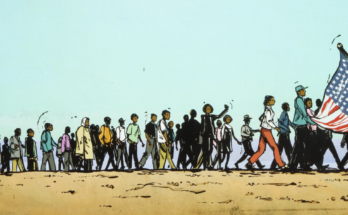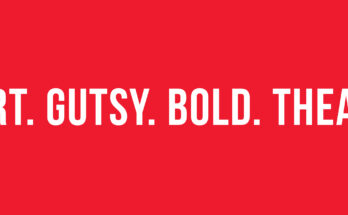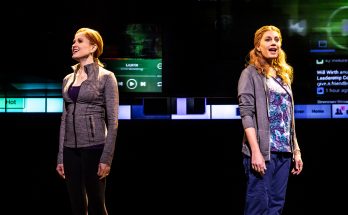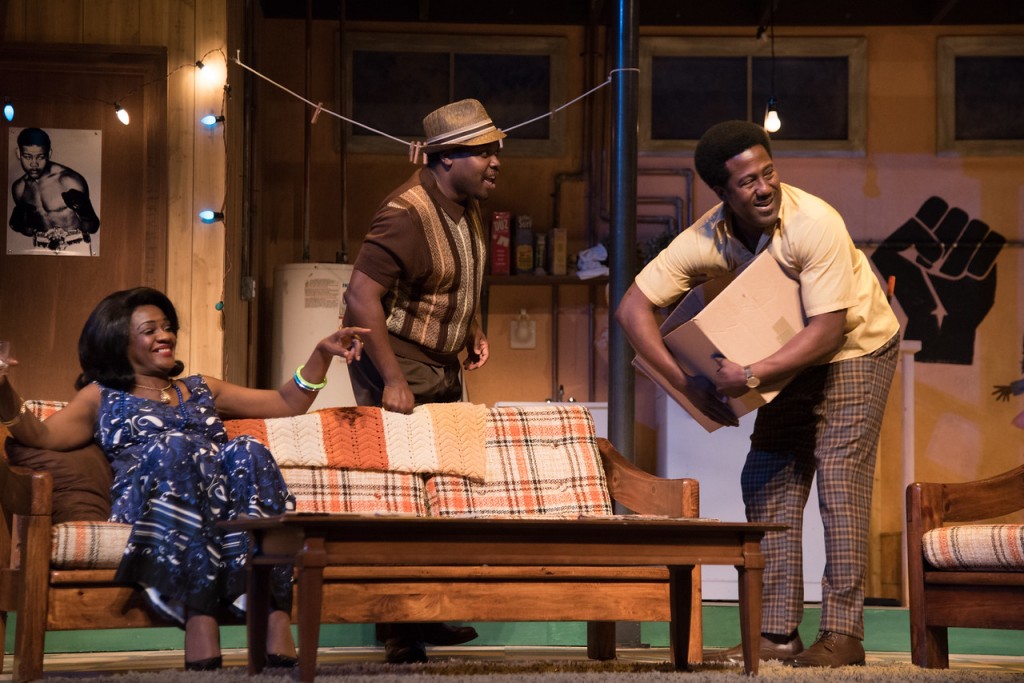
::
True Colors Theatre Company’s “Detroit ’67” runs through March 8. Details, tickets HERE, at 877.725.8849 or www.truecolorstheatre.org.
::
IT STARTED, in the real version and in the retold version, in a blind pig, an old slang term for an after-hours joint where one can buy alcohol that’s not exactly licensed and not exactly legal.
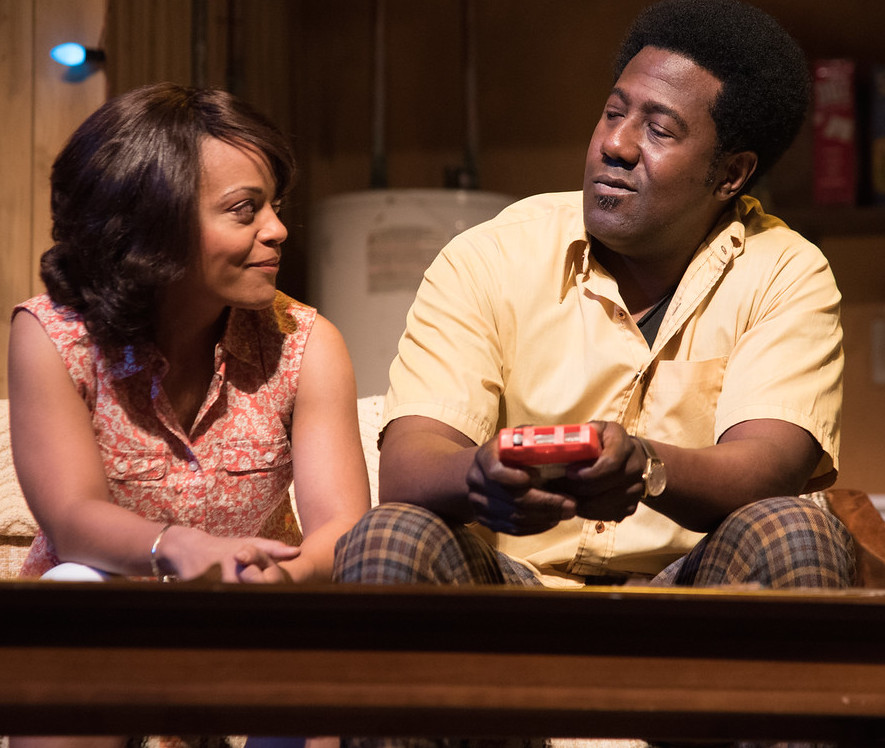
When police raided an African-American blind pig in Detroit in the early morning of July 23, 1967, the confrontation escalated and sparked one of the most devastating riots in American history. Five days later, 43 people were dead, more than 7,200 had been arrested, 2,000 buildings were destroyed, and the National Guard and tanks had rolled on the city’s streets. Of the dozens of race-related disturbances in U.S. cities that long, hot summer, Detroit was by far the most scarring and consequential.
Dominique Morisseau’s play Detroit ’67 also starts in a fictional blind pig, one owned by a brother and sister named Chelle and Lank. But the vision of Detroit ’67 is not limited to the Motor City or the tumultuous 1960s.
“The past is never dead,” wrote William Faulkner. “It’s not even past.” And Detroit ’67, which won the 2014 Edward M. Kennedy Prize for Drama Inspired by American History, comes to Atlanta this month juxtaposed against the recent, “not-even-past” news datelines out of Ferguson, Mo., and Staten Island, N.Y., and everywhere that the unheard aspire to be heard.
MORISSEAU WROTE the play in 2011, and was stunned when current events — the nationwide protests following the deaths of Michael Brown and Eric Garner at the hands of police — began matching up with history.
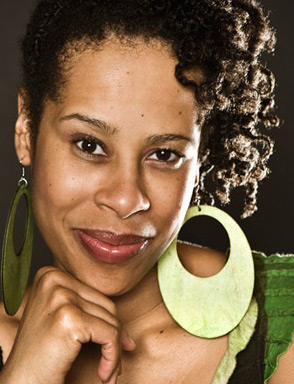
Even the terminology is controversial. “Riot,” as well as “race riot,” was how the media framed events at the time, and that has persisted. Morisseau’s play is part of a counter-narrative.
“Black Detroiters at the time were not looking at this as a riot,” she says. “This was an uprising against police brutality and against disenfranchisement. It definitely speaks to how disenfranchised people will eventually strike out in discontent, then and now.”

Kamilah Forbes, artistic director of New York’s Hip-Hop Theater Festival and director of this True Colors staging, agrees.
“The word ‘riot’ is a false perception of the situation. What we were seeing here was more an uprising or civil unrest,” she says. “These were everyday people, unarmed people, and many of them had rage and fury and no place to put it. It was a very tense relationship, with the Detroit police making unlawful arrests and using excessive force.
“So that sort of mirrors what’s happening now, with Ferguson and Eric Garner,” she adds. “Whenever we think about something in 1967 it feels so foreign. But now we have too many touch points to know how that feels.”
Although the play is serious, critics have noted its comic touches as well as the way it uses Motown songs. For True Colors, they’re played on a genuine vintage eight-track player bought on eBay and positioned onstage. But in the context of the drama and the unrest, the songs by the Temptations, Smokey Robinson and the Miracles, the Four Tops and others don’t always come off as the easygoing baby-boomer soundtrack they’ve become over the years.
“Motown music was a full expression not only of Detroit, the culture and the people, but it’s the narrative of blacks at that time, in happy moments, sad, political, mournful, angry,” says Forbes. “[Curtis Mayfield’s’] ‘People Get Ready’ is a battle cry, a call to action. When we hear the music in the play, it’s to get inspired, to speak solid, to celebrate.”
THE DEATH AND DESTRUCTION that happened in Detroit does not fit neatly into the Black History Month civil rights pantheon of Rosa Parks and Selma, etc.
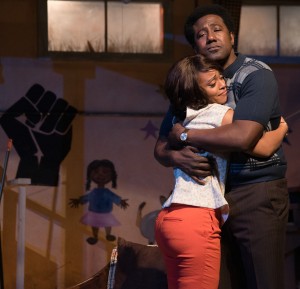
“Social turmoil did not cease with the passage of the civil rights bills,” Morisseau says. A native Detroiter, she wrote Detroit ’67 as “a love song to my city, because of how the media narrowly portrays Detroit. It’s not to clean up or sanitize my city, but to write about the people with love and humanity and in three dimensions.”
(The play is part of Morisseau’s Detroit trilogy, which includes Paradise Blue, set in 1949, and Skeleton Crew, set in 2008.)
True Colors managing director Jenn Dwyer says the theater began looking at the script almost two years ago, after its premiere at New York’s Public Theater. Then came the Kennedy Prize and the civil arrest of this past summer and fall. “It became apparent that this play has a bigger message,” she says.
“Detroit ’67 is a period piece centered around a brother and sister who are jamming to the tunes of Motown and find themselves caught up in the riots of 1967. Step back and change the soundtrack,” Dwyer says, “and this scenario could take place in almost any city today given the recent history of gentrification, racial profiling and police violence.”
A few weeks before his assassination the Rev. Martin Luther King Jr. gave a speech that is frequently quoted: “A riot,” he said, “is the language of the unheard.” Quoted less frequently is another line from that speech, one that predicted where we stand almost 50 years after Detroit: “As long as justice is postponed, we always stand on the verge of these darker nights of social disruption.”
::
Phil Kloer has written about the arts in Atlanta for 30 years, for The Atlanta Journal-Constitution and the website ArtsATL.com as well as Encore Atlanta.

